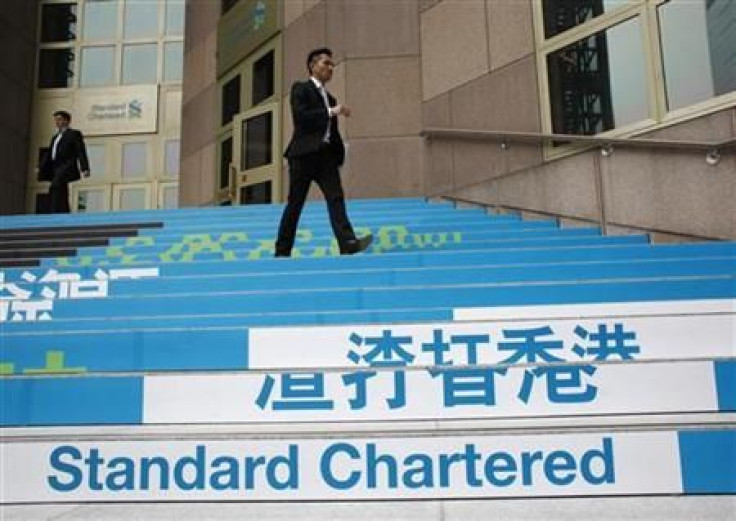Nomura Urges Dumping Accused Money Launderer Standard Chartered For Admitted Money Launderer HSBC

Citing reputation and legal risks, several brokers Tuesday downgraded their recommendations of British bank Standard Chartered after an accusation by a New York state regulator that the bank was a "rogue institution" willfully laundering money for the Iranian government.
The explosive legal brief, in which the New York State Department of Financial Services said Standard Chartered "engaged in deceptive and fraudulent misconduct in order to move at least $250 billion through its New York branch on behalf of client Iranian financial institutions that were subject to U.S. economic sanctions, and then covered up its transgressions," was the talk of Wall Street most of the day.
Blaming the bank's "evident zeal to make hundreds of millions of dollars at almost any cost," the regulator said the bank "indisputably helped sustain a global threat to peace and stability" and threatened to revoke its banking license in the state.
The bank responded, saying the regulator was off-base, and possibly reaching beyond its jurisdiction. It noted "Standard Chartered ceased all new business with Iranian customers in any currency over five years ago. The Group has made presentations to the DFS and other US agencies concerning the strength of its global sanctions compliance programme during the period under review and through to the present day."
"A review of its Iranian payments also did not identify a single payment on behalf of any party that was designated at the time by the US Government as a terrorist entity or organization," the bank also said.
Regardless, brokers told their clients to head for the hills. Bank of America cut the bank by two notches, from buy to sell, noting "information about the validity of the transactions is essential before we can even begin to quantify any potential liability." London-based Oriel Securities also gave the firm a double-notch downgrade, while Boston-headquartered Cannacord Genuity, which already marked the issue at underperform, issued a note that was critical of the bank.
The most interesting note, however, came from London-based equity researchers for Japanese financial conglomerate Nomura, which downgraded the bank one notch, to neutral, saying "in the face of these headline risks, it is difficult for us to recommend investors buy the stock."
"Even if we were to see the stock sell off some more from current levels, we would still have difficulty recommending the stock in the face of an unquantifiable and potentially large risk from the negative outcomes of these allegations," analysts at Nomura added.
What was notable was Nomura's recommendation of what to buy instead.The broker suggested clients could load up on shares of HSBC. It is not unusual for brokers to suggest clients rebalancing their portfolios move away from a specific company-related exposure and substitute shares in the dumped firm with those of a company in the same industry sub-group.
But Nomura's recommendations was ironic in the extreme, essentially advising clients to substitute an admitted money launderer for an accused money launderer. Earlier this year, HSBC executives were grilled in the U.S. Senate after a Congressional investigation found the company had laundered over $30 billion for international drug cartels and terrorist organizations. HSBC apologized, admitting "compliance mistakes."
Not all international money launderers, it seems, are built the same.
© Copyright IBTimes 2024. All rights reserved.











